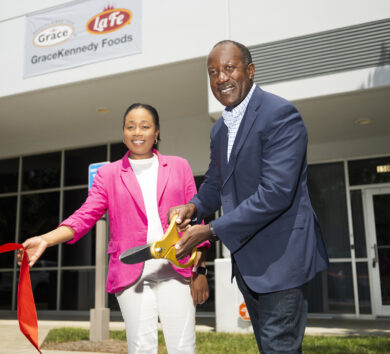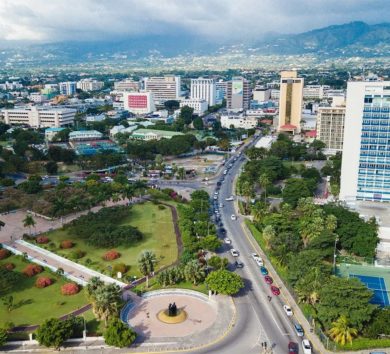
By Al Edwards
Food and distribution group Seprod is not suspending its expansion and retooling plans due to the COVID-19 pandemic, rather it is pressing ahead and looking for opportunities.
Last year Seprod incurred an inordinate level of expenses due in the main to its efforts to extricate itself from its sugar factory operations and the closure of its Serge Island plant in St Thomas.
The calling of time on the sugar factory, including redundancy costs and other expenses came in at around $750 million with the closure of Serge Island in St Thomas adding another J$300 million in expenses.
The decision to rationalise and opt out of business lines that continue not to bear fruit now allows Seprod to turn its attention to its major strength which is distribution.
Speaking at the Group’s recently held AGM at The Jamaica Pegasus hotel in New Kingston, Jamaica, CEO Richard Pandohie explained: “ In 2019 we exited the hugely unprofitable sugar manufacturing operations and consolidated the dairy operations.
“Over the last few years we have doubled down on equipment investment and retooling but now our focus has shifted to distribution both domestic and export together with our logistic and warehousing efforts. These areas are the lifeblood of the organisation.
“We are projected to spend over J$2.5 billion to build out and consolidate our warehouse operations and create a distribution organisation that will be cost competitive, agile and with a customer footprint second to none. The first phase was completed in 2019 and the second phase is scheduled for completion for the third quarter of 2021.”

Seprod is one of the largest distribution companies in the Caribbean and has a number of international brands in its portfolio including, Kraft, Cadbury, Bayer, Heinz, Goya, Brunswick and Pfizer. It employs 2,000 people directly and indirectly.
For the six months ended June 30, 2020 Seprod Group produced revenues of J$18.6 billion, a 12 per cent increase on the prior year. Net profit came in at J$1.2 billion, an increase of J$648 million on the same period for 2019.
Last year, while closing its sugar manufacturing business and merging its two dairy operations to become Serge Dairies, Seprod managed to grow its sales by over 45 per cent with a 20 per cent increase in export sales over 2018’s figure. This was due in part from the acquisition of Facey Commodity.
More recently, Seprod has experienced escalating expenses which has to be wrestled under control as it looks to operate more efficiently in the Covid paradigm. In 2018 the cost of inventory was J$11.7 billion but that ballooned to J$20.1 billion in 2019, an increase of J$8.4 billion or put another way, a rise by 71.2 per cent.
In 2018 total revenue came in at J$23.4 billion with expenses being a whopping J$22.3 billion. For that year the Group posted a profit of J$1.1 billion.
This translates to 95 cents going to expenses and just five cents to profit for every dollar of revenue earned in 2018.

The following year, total revenue stood at J$34.4 billion with expenses coming in at J$33.4 billion. The year 2019 saw Seprod posting a net profit of J$973.3 million.
At the AGM, Chairman P.B. Scott explained why the Group incurred such high expenses. In the case of the cost of inventory he pointed out that an increase in sales induces an increase in cost of sales.
“There were two structural events that cost a lot of money. The first and most important, which was disappointing but necessary, was the closure of the sugar factory. That cost us a total of J$750 million last year. That effectively was the cost of making provisions for all the account receivables that we did not think we were going to collect, the machinery we were not going to use and the redundancy payouts.
“The other cost was the closure of our Serge Island plant in St Thomas which has been well discussed. It cost us about J$300 million to move the factory to Bog Walk which meant a lot of engineering costs. Combined that total cost of around J$1 billion will not be repeated this year.”
Scott went on to add that Seprod’s level of cash is now the highest it’s been since he first became a director, which was back in 1995. He used the opportunity to declare that Seprod is in very good shape and is looking to make greater strides over the next year.
While the sugar factory in St Thomas has been shuttered, Seprod intends to continue investing in St Thomas where it already has 6000 cows.
The healthy eating industry has not escaped Seprod’s attention and last month it launched its gluten-free cassava flour. It will now be extending its gluten-free product line. It has also vowed to create the most modern diary farms in the Caribbean.
For too long, Jamaican companies have considered Jamaica as their domestic market. CARICOM is where we need to be looking at as our domestic market.
Richard Pandohie, Seprod CEO and Managing Director
Pandohie emphatically declared that Seprod sees CARICOM as its domestic market and is not solely focused on Jamaica. The way he sees it, Seprod is a Caribbean company headquartered in Jamaica.
“We consider CARICOM our domestic market. For too long, Jamaican companies have considered Jamaica as their domestic market. CARICOM is where we need to be looking at as our domestic market. Seprod will participate in all the markets within CARICOM in an aggressive way. We are now shipping fresh milk to Trinidad. The opportunity is about replacing inputs into the region with locally produced products. We are already in Guyana,” said the Group’s CEO and managing director.
The AGM oversaw the re-election of Scott, Nicholas Scott, Michael Subraite and Peter J. Thwaites as directors.







Comments